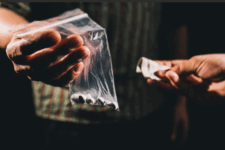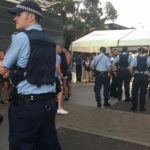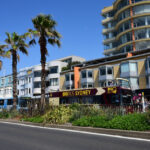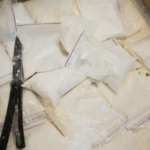The Various Offences of Drug Supply in New South Wales

A 29-year-old woman from the southwestern New South Wales town of Young was charged with 56 drug offences on Thursday 2 October 2025, whilst her 19-year-old male counterpart has been charged with five crimes involving illicit substances. NSW Police Strike Force Hourgla had raided the pair on the day prior in relation to information regarding the drug trade in the country town.
The pair are now being held on remand, or prior to conviction, after being refused bail. They had been living on Wiradjuri and Ngunnawal land in the same residence on Nasmyth Street in Young. This was the place that officers from the Hume Police District executed a warrant at 9.20 am on Wednesday last week, to secure sizeable amounts of cash and drugs at the premises.
According to NSW Police News, attending officers located mobile phones, an amount of cannabis, 43 grams of psilocybin: this is the drug commonly referred to as “magic mushrooms”, which grows wild in fields in rural NSW. Common types of “mushies” are golden tops, blue meanies and liberty caps. Officers also located 12.5 methamphetamine tablets and one gram of meth at the residence.
The majority of charges involved supplying prohibited drugs, which means the pair were allegedly dealing the substances. NSW police has laid 51 supply offences against the woman and two against the teenager. The woman’s charges include commercial supply, which relates to the selling of the magic mushrooms, as 25 grams of magic mushrooms is considered a commercial quantity in NSW law.
The NSW legislation governing drug crime is the Drug Misuse and Trafficking Act 1985 (NSW) (the DMT Act). There are different offences related to the crime of supplying illegal drugs, and they’re accompanied by a framework of quantities that relate to the various types of illicit substances and penalties that apply. So, the penalties related to drug supply get harsher as the amount sold rises.
Supply of prohibited drug
The Young woman has been charged with 49 counts of supply prohibited drug in various quantities and three counts of supply drug on an ongoing basis, while her younger alleged partner-in-crime has been charged with two counts of supply prohibited drug. Both individuals have also been charged with drug possession offences.
The offence of drug supply is contained in section 25(1) of the DMT Act. This applies when the quantity of a drug involved is less than or equal to a small amount, as well as an indictable quantity, and the maximum penalty is 15 years prison and/or a fine of $22,000. This is unless it relates to cannabis leaf, as then the related gaol time is up to 10 years, while the fine remains the same.
The penalties above relate to drug supply when tried in the NSW District or Supreme Court. If a charge related to a small quantity of drug supply is heard in the NSW Local Court, the maximum penalty is 2 years prison and/or a fine of $5,500. If a charge related to an indictable quantity is heard in the Local Court, the related prison time remains the same but the fine rises to $11,000.
If the supply relates to a commercial quantity or larger, then being tried in the NSW Local Court is not an option. Section 25(2) contains the offence of commercial supply of an illicit substance, which carries up to 20 years imprisonment and/or a fine of $385,000. If the crime, however, relates to cannabis leaf the amount of prison time drops to 15 years, but the fine remains the same.
Offences for large commercial supply are charged under section 25(2) as well. Large commercial supply carries up to life imprisonment and/or a fine of $550,000, unless the crime relates to cannabis leaf and then the fine remains the same, while 20 years inside applies. The offence of large commercial supply also carries a standard non-parole period (SNPP) of 10 years prison.
An SNPP is a guidepost or reference point for a sentencing judge, when determining the minimum term an offender must spend behind bars before being eligible to apply for release on parole.
The penalties related to drug supply increase if a person older than 18 has supplied a person under 16 with illicit substances. If individuals are convicted of conspiring to supply drugs, under section 26 of the DMT Act, it means that they sought to carry out the crime of supply without having done so, and the same penalties apply regardless of whether the crime was successfully perpetrated or not.
The woman from Young was also charged with three counts of ongoing supply, contrary to section 25A of the DMT Act. To prove the crime, it must be shown that an individual supplied an illegal drug, besides cannabis, on three occasions within 30 days for financial gain. The maximum penalties that apply to these crimes are 20 years prison time and/or a fine of $385,000.
A sliding scale of quantities
Schedule 1 of the DMT Act contains a list of over 200 illegal drugs, prohibited plants, precursors and reagents. Beside each of these illicit substances is a quantity related to a small amount, a traffickable quantity, an indictable quantity, a commercial quantity and a large commercial quantity of the illegal drug. Offences related to cannabis leaf, precursors and reagents usually receive lesser penalties.
So, in the case of the 29-year-old woman from Young, she was found in possession of 43 grams of psilocybin. Schedule 1 sets out that a small quantity of psilocybin is up to 0.04 grams. A traffickable quantity is 0.15 grams. An indictable quantity of psilocybin is 0.25 grams. A commercial quantity of psilocybin is 25 grams, while a large commercial quantity is 100 grams.
In terms of heroin and cocaine, a small quantity is considered 1 gram, a traffickable quantity is 3 grams, an indictable quantity is 5 grams, a commercial quantity is 250 grams, and a large commercial quantity is 1 kilogram.
Section 29 of the DMT Act contains the controversial NSW law of deemed supply. This offence provides that a person who is found in possession of at least a traffickable amount of an illicit substance is automatically considered to be in its possession for the purpose of supply. And the penalties for deemed supply relate to the sliding scale of quantities related to each substance.
Section 4 of the DMT contains the admixture rule, which relates to charges of supply. This stipulation means that a person found in possession of an illegal drug will be charged with the entire weight of the substance seized, regardless of its purity.
An antiquated system
There are many drug law reformists in the NSW community who have long been advocating for changes to the NSW drug law regime, so that it moves towards treating drug use and personal possession as a health issue and not a crime.
A key drug law reformist in this state is former NSW Director of Public Prosecutions Nicolas Cowdery, who holds the title of the longest serving NSW DPP, coming in at 17 years. Cowdery has long been calling for the repeal of the law of deemed supply, as he considers it unjust. The law itself was legislated nationwide due to a moral panic over drugs, but other jurisdictions have since dropped it.
Cowdery told Sydney Criminal Lawyers last year that he advocates for “a system of regulation (by law) of the growth and production, distribution, supply, possession and use of all drugs, with a tax imposed on those profiting commercially”. The legal professional added that different drugs would be regulated and managed in different ways, so heroin and meth could be available via prescription.
“Anyone choosing to operate outside the regulated system would remain liable to the same sort of criminal sanctions that presently apply. Hopefully they would find it uncompetitive to be involved,” said Cowdery in January 2024.
“In the meantime, I support decriminalisation of drug use and possession as in Portugal. It has been working well there for many years.”







